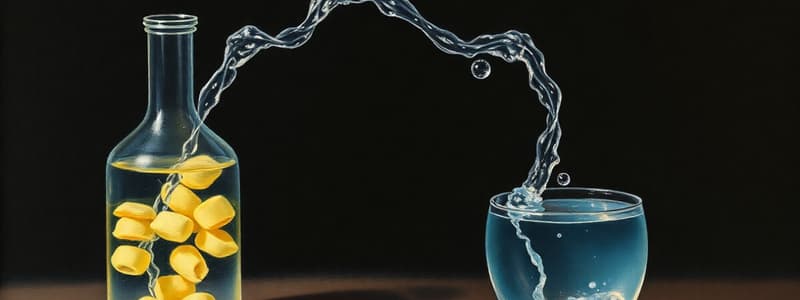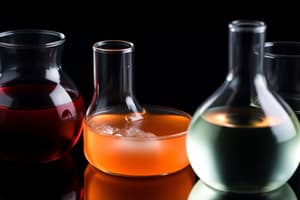Podcast
Questions and Answers
What is the primary role of a solvent in a solution?
What is the primary role of a solvent in a solution?
Which factors primarily affect the solubility of gases in liquids?
Which factors primarily affect the solubility of gases in liquids?
What distinguishes a compound from an element?
What distinguishes a compound from an element?
What is the primary characteristic of isotopes?
What is the primary characteristic of isotopes?
Signup and view all the answers
What is the process of nuclear fission characterized by?
What is the process of nuclear fission characterized by?
Signup and view all the answers
Which of the following particles is emitted during alpha decay?
Which of the following particles is emitted during alpha decay?
Signup and view all the answers
What is the formula that describes the energy released in nuclear fission?
What is the formula that describes the energy released in nuclear fission?
Signup and view all the answers
Which of the following statements about atomic structure is true?
Which of the following statements about atomic structure is true?
Signup and view all the answers
How does an increase in temperature generally affect the solubility of solids in liquids?
How does an increase in temperature generally affect the solubility of solids in liquids?
Signup and view all the answers
Which of the following is NOT a feature of metals?
Which of the following is NOT a feature of metals?
Signup and view all the answers
Study Notes
Solutions
- Solutions have two parts: a solvent and a solute
- Solvent dissolves the solute
- Aqueous solution: Water is the solvent
- Solubility: The ability of a solute to dissolve in a solvent
- Solubility increases with temperature for most solids
- Solubility decreases with temperature for gases
- Pressure affects gas solubility; higher pressure increases gas solubility
Pressure and Solubility
- External pressure has little effect on solid solubility in liquids
- External pressure greatly affects gas solubility
- Increased pressure increases gas solubility in liquids
- Examples: Increased pressure in a coke can keeps CO₂ dissolved
- Decreasing pressure releases gases
Elements and Compounds
- Pure substances are made of identical particles
- Elements are the simplest pure substances
- Elements cannot be changed into simpler substances
- Atoms: The smallest particles of an element with characteristic properties
- Atoms of the same element are identical
- Chemical Symbols: use one or two letters, the first capitalized
- Compounds are made of two or more elements chemically combined
- Compound properties differ from their constituent elements
- Compounds are formed from molecules
- Chemical Formulas: represent compounds using symbols and subscripts
Atomic Theory
- Atoms have a nucleus with protons (positive charge) and neutrons (neutral charge)
- Electrons (negative charge) orbit the nucleus
- Atomic number: Number of protons in an atom
- Mass number: Sum of protons and neutrons
- Isotopes: Different forms of an element with varying neutron numbers
- Atomic mass: The average mass of all isotopes
Radioactivity
- Radioactivity: The spontaneous disintegration of an atom's nucleus to form a different element
- Three types of Radioactive decay:
- Alpha decay: Releases an alpha particle (2 protons + 2 neutrons)
- Beta decay: Releases high-speed electrons, changing a neutron into a proton
- Gamma decay: Releases high-energy electromagnetic waves (gamma rays)
Nuclear Fission and Fusion
- Nuclear Fission: Splitting a heavy nucleus into lighter fragments, releasing energy
- Example: Nuclear power, atomic bombs
- Nuclear Fusion: Joining lighter nuclei to form a heavier nucleus, releasing energy
- Example: The Sun
Studying That Suits You
Use AI to generate personalized quizzes and flashcards to suit your learning preferences.
Description
This quiz covers key concepts related to solutions, solubility, and the impact of pressure on gas solubility. Understanding the distinctions between solvents and solutes, as well as the solubility behavior of solids and gases, is crucial in chemistry. Test your knowledge on these fundamental topics!




